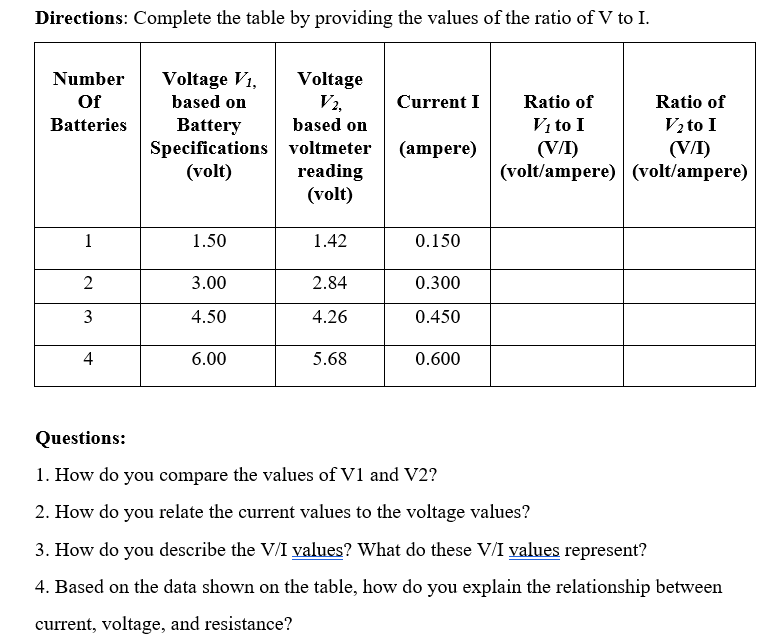1. How do you compare the values of V1 and V2? 2. How do you relate the current values to the voltage values? 3. How do you describe the VI values? What do these V/I values represent? 4. Based on the data shown on the table, how do you explain the relationship between current, voltage, and resistance?
1. How do you compare the values of V1 and V2? 2. How do you relate the current values to the voltage values? 3. How do you describe the VI values? What do these V/I values represent? 4. Based on the data shown on the table, how do you explain the relationship between current, voltage, and resistance?
College Physics
10th Edition
ISBN:9781285737027
Author:Raymond A. Serway, Chris Vuille
Publisher:Raymond A. Serway, Chris Vuille
Chapter17: Current And Resistance
Section: Chapter Questions
Problem 3CQ
Related questions
Question
100%
Please solve all of the variables needed in the table.

Transcribed Image Text:Directions: Complete the table by providing the values of the ratio of V to I.
Voltage V1,
based on
Number
Voltage
V2,
Of
Current I
Ratio of
Ratio of
Vị to I
(V/I)
(volt/ampere) (volt/ampere)
V2 to I
(V/I)
Batteries
Battery
Specifications voltmeter
(volt)
based on
(ampere)
reading
(volt)
1
1.50
1.42
0.150
2
3.00
2.84
0.300
4.50
4.26
0.450
4
6.00
5.68
0.600
Questions:
1. How do you compare the values of V1 and V2?
2. How do you relate the current values to the voltage values?
3. How do you describe the V/I values? What do these V/I values represent?
4. Based on the data shown on the table, how do you explain the relationship between
current, voltage, and resistance?
3.
Expert Solution
This question has been solved!
Explore an expertly crafted, step-by-step solution for a thorough understanding of key concepts.
Step by step
Solved in 5 steps

Knowledge Booster
Learn more about
Need a deep-dive on the concept behind this application? Look no further. Learn more about this topic, physics and related others by exploring similar questions and additional content below.Recommended textbooks for you

College Physics
Physics
ISBN:
9781285737027
Author:
Raymond A. Serway, Chris Vuille
Publisher:
Cengage Learning

College Physics
Physics
ISBN:
9781285737027
Author:
Raymond A. Serway, Chris Vuille
Publisher:
Cengage Learning